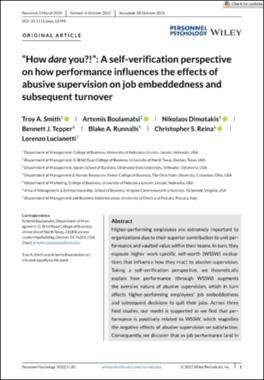| dc.contributor.author | Smith, Troy A. | |
| dc.contributor.author | Boulamatsi, Artemis | |
| dc.contributor.author | Dimotakis, Nikolaos | |
| dc.contributor.author | Tepper, Bennett J. | |
| dc.contributor.author | Runnalls, Blake A. | |
| dc.contributor.author | Reina, Christopher S. | |
| dc.contributor.author | Lucianetti, Lorenzo | |
| dc.date.accessioned | 2022-02-15T21:40:59Z | |
| dc.date.available | 2022-02-15T21:40:59Z | |
| dc.date.issued | 2022 | |
| dc.identifier | oksd_dimotakis_howdareyou_2022 | |
| dc.identifier.citation | Smith, T. A., Boulamatsi, A., Dimotakis, N., Tepper, B. J., Runnalls, B. A., Reina, C. S., & Lucianetti, L. (2022). "How dare you?!": A self-verification perspective on how performance influences the effects of abusive supervision on job embeddedness and subsequent turnover. Personnel Psychology, pp. 1-30. https://doi.org/10.1111/peps.12494 | |
| dc.identifier.uri | https://hdl.handle.net/11244/334624 | |
| dc.description.abstract | Higher-performing employees are extremely important to organizations due to their superior contribution to unit performance and vaulted value within their teams. In turn, they espouse higher work-specific self-worth (WSSW) evaluations that influence how they react to abusive supervision. Taking a self-verification perspective, we theoretically explain how performance (through WSSW) augments the aversive nature of abusive supervision, which in turn affects higher-performing employees' job embeddedness and subsequent decisions to quit their jobs. Across three field studies, our model is supported as we find that performance is positively related to WSSW, which magnifies the negative effects of abusive supervision on satisfaction. Consequently, we discover that as job performance (and in turn self worth) increases, abusive supervision indirectly reduces job embeddedness and increases turnover through two forms of satisfaction. We expound upon how these findings contribute to both theory and practice. | |
| dc.format | application/pdf | |
| dc.language | en_US | |
| dc.publisher | Wiley | |
| dc.relation.ispartof | Personnel Psychology | |
| dc.rights | This material has been previously published. In the Oklahoma State University Library's institutional repository this version is made available through the open access principles and the terms of agreement/consent between the author(s) and the publisher. The permission policy on the use, reproduction or distribution of the material falls under fair use for educational, scholarship, and research purposes. Contact Digital Resources and Discovery Services at lib-dls@okstate.edu or 405-744-9161 for further information. | |
| dc.subject | 1503 Business and Management | |
| dc.subject | 1701 Psychology | |
| dc.subject | Business & Management | |
| dc.title | "How dare you?!": A self-verification perspective on how performance influences the effects of abusive supervision on job embeddedness and subsequent turnover | |
| dc.date.updated | 2022-02-11T15:01:17Z | |
| osu.filename | oksd_dimotakis_howdareyou_2022.pdf | |
| dc.description.peerreview | Peer reviewed | |
| dc.identifier.doi | 10.1111/peps.12494 | |
| dc.description.department | Business Management | |
| dc.type.genre | Article | |
| dc.type.material | Text | |
| dc.subject.keywords | abusive supervision | |
| dc.subject.keywords | job embeddedness | |
| dc.subject.keywords | job performance | |
| dc.subject.keywords | satisfaction | |
| dc.subject.keywords | self-worth | |
| dc.subject.keywords | voluntary turnover | |
| dc.identifier.author | ORCID: 0000-0002-8173-8511 (Smith, TA) | |
| dc.identifier.author | ScopusID: 56020216000 (Smith, TA) | |
| dc.identifier.author | ORCID: 0000-0001-9854-1750 (Boulamatsi, A) | |
| dc.identifier.author | ScopusID: 57195198287 (Boulamatsi, A) | |
| dc.identifier.author | ORCID: 0000-0001-8448-1072 (Dimotakis, N) | |
| dc.identifier.author | ScopusID: 24586837300 (Dimotakis, N) | |
| dc.identifier.author | ScopusID: 7005360542 (Tepper, BJ) | |
| dc.identifier.author | ScopusID: 57201497874 (Runnalls, BA) | |
| dc.identifier.author | ORCID: 0000-0002-7876-9771 (Reina, CS) | |
| dc.identifier.author | ScopusID: 56268905700 (Reina, CS) | |
| dc.identifier.author | ScopusID: 36559910100 (Lucianetti, L) | |
